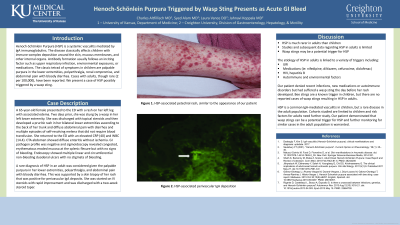Back


Poster Session A - Sunday Afternoon
Category: GI Bleeding
A0325 - HSP Triggered by Wasp String Presents as Acute GI Bleeding
Sunday, October 23, 2022
5:00 PM – 7:00 PM ET
Location: Crown Ballroom

Has Audio

Charlie Altfillisch, MD
University of Kansas Medical Center
Kansas City, MO
Presenting Author(s)
Charlie Altfillisch, MD1, Syed M. Alam, MD2, Laura M. Vance, DO3, Jahnavia Koppala, MBBS3
1University of Kansas Medical Center, Kansas City, MO; 2Creighton University, Omaha, NE; 3Creighton University Medical Center, Omaha, NE
Introduction: Henoch-Schonlein Purpura (HSP) is a systemic vasculitis mediated by IgA immunoglobulins. The disease classically affects children with immune-complex deposition around the skin, mucous membranes, and other internal organs. Antibody formation usually follows an inciting factor such as upper respiratory infection, environmental exposures, or medications. The classic tetrad of symptoms in children are palpable purpura in the lower extremities, polyarthralgia, renal compromise, and abdominal pain with bloody diarrhea. Cases with adults, though rare (2 per 100,000), have been reported. We present a case of HSP possibly triggered by a wasp sting.
Case Description/Methods: A 65-year-old female presented to the ED with a rash on her left leg with associated edema. Two days prior, she was stung by a wasp in her left lower extremity. She was discharged with topical steroids and then developed a pruritic rash in her bilateral lower extremities ascending to the back of her trunk and diffuse abdominal pain with diarrhea. She returned to the ED with an elevated CRP (40) and WBC (14.4). CTA abdomen showed diffuse enteritis without ischemia. GI pathogen profile was negative and sigmoidoscopy revealed congested, erythematous eroded mucosa at the splenic flexure but with no signs of bleeding. Endoscopy showed multiple linear and circumferential non-bleeding duodenal ulcers with no stigmata of bleeding.
A rare diagnosis of HSP in an adult was considered given the palpable purpura in her lower extremities, polyarthralgia, and abdominal pain with bloody diarrhea. This was supported by a skin biopsy of her rash that was positive for perivascular IgA deposits. She was started on IV steroids with rapid improvement and was discharged with a two-week steroid taper.
Discussion: The etiology of HSP in adults is linked to a variety of triggers including: URI, medications, HIV, hepatitis B and autoimmune and environmental factors. Our patient denied recent infections, new medications or autoimmune disorders but had suffered a wasp sting the day before her rash developed. Bee stings are a known trigger in children, but there are no reported cases of wasp stings resulting in HSP in adults.
HSP is a common IgA-mediated vasculitis in children, but a rare disease in the adult population. Cohorts studied are limited to children and risk factors for adults need further study. Our patient demonstrated that wasp stings can be a potential trigger for HSP and further monitoring for similar cases in the adult population is warranted.
Disclosures:
Charlie Altfillisch, MD1, Syed M. Alam, MD2, Laura M. Vance, DO3, Jahnavia Koppala, MBBS3. A0325 - HSP Triggered by Wasp String Presents as Acute GI Bleeding, ACG 2022 Annual Scientific Meeting Abstracts. Charlotte, NC: American College of Gastroenterology.
1University of Kansas Medical Center, Kansas City, MO; 2Creighton University, Omaha, NE; 3Creighton University Medical Center, Omaha, NE
Introduction: Henoch-Schonlein Purpura (HSP) is a systemic vasculitis mediated by IgA immunoglobulins. The disease classically affects children with immune-complex deposition around the skin, mucous membranes, and other internal organs. Antibody formation usually follows an inciting factor such as upper respiratory infection, environmental exposures, or medications. The classic tetrad of symptoms in children are palpable purpura in the lower extremities, polyarthralgia, renal compromise, and abdominal pain with bloody diarrhea. Cases with adults, though rare (2 per 100,000), have been reported. We present a case of HSP possibly triggered by a wasp sting.
Case Description/Methods: A 65-year-old female presented to the ED with a rash on her left leg with associated edema. Two days prior, she was stung by a wasp in her left lower extremity. She was discharged with topical steroids and then developed a pruritic rash in her bilateral lower extremities ascending to the back of her trunk and diffuse abdominal pain with diarrhea. She returned to the ED with an elevated CRP (40) and WBC (14.4). CTA abdomen showed diffuse enteritis without ischemia. GI pathogen profile was negative and sigmoidoscopy revealed congested, erythematous eroded mucosa at the splenic flexure but with no signs of bleeding. Endoscopy showed multiple linear and circumferential non-bleeding duodenal ulcers with no stigmata of bleeding.
A rare diagnosis of HSP in an adult was considered given the palpable purpura in her lower extremities, polyarthralgia, and abdominal pain with bloody diarrhea. This was supported by a skin biopsy of her rash that was positive for perivascular IgA deposits. She was started on IV steroids with rapid improvement and was discharged with a two-week steroid taper.
Discussion: The etiology of HSP in adults is linked to a variety of triggers including: URI, medications, HIV, hepatitis B and autoimmune and environmental factors. Our patient denied recent infections, new medications or autoimmune disorders but had suffered a wasp sting the day before her rash developed. Bee stings are a known trigger in children, but there are no reported cases of wasp stings resulting in HSP in adults.
HSP is a common IgA-mediated vasculitis in children, but a rare disease in the adult population. Cohorts studied are limited to children and risk factors for adults need further study. Our patient demonstrated that wasp stings can be a potential trigger for HSP and further monitoring for similar cases in the adult population is warranted.
Disclosures:
Charlie Altfillisch indicated no relevant financial relationships.
Syed Alam indicated no relevant financial relationships.
Laura Vance indicated no relevant financial relationships.
Jahnavia Koppala indicated no relevant financial relationships.
Charlie Altfillisch, MD1, Syed M. Alam, MD2, Laura M. Vance, DO3, Jahnavia Koppala, MBBS3. A0325 - HSP Triggered by Wasp String Presents as Acute GI Bleeding, ACG 2022 Annual Scientific Meeting Abstracts. Charlotte, NC: American College of Gastroenterology.
